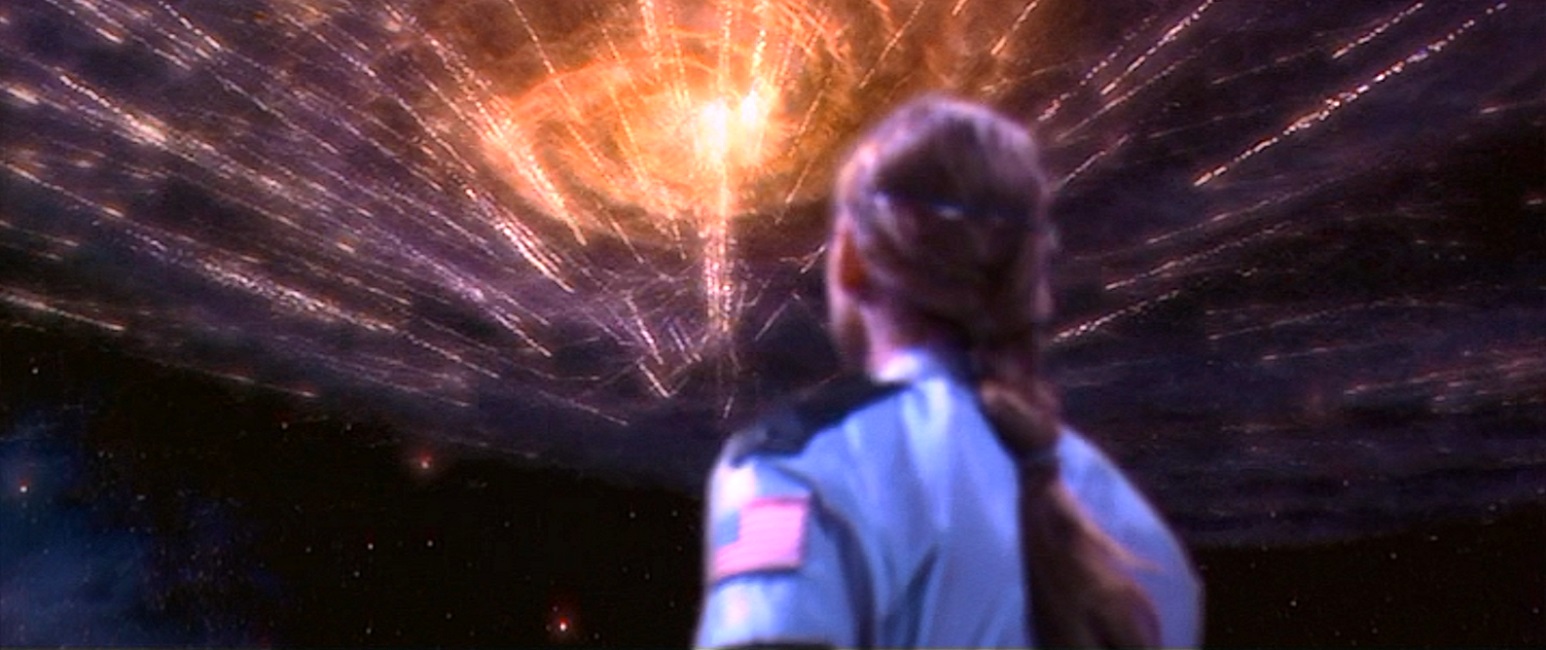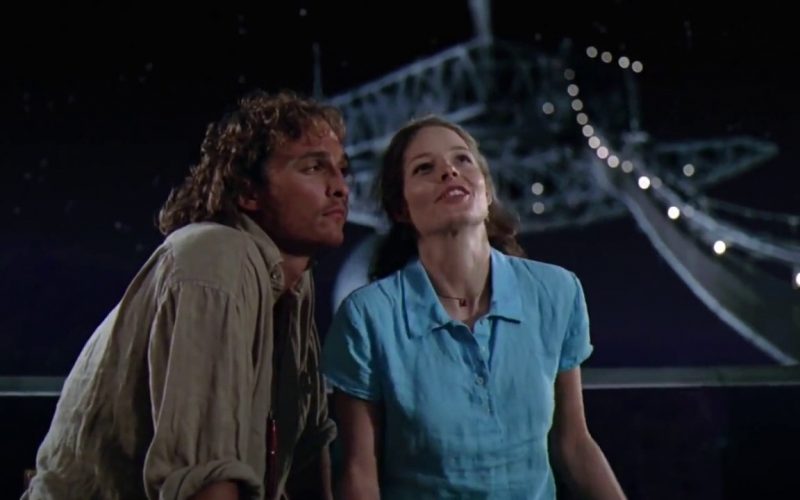Science and Faith 20 years after Contact.
Science fiction is arguably the most enduring genre of them all. More-so than any other, it grows and evolves with the world and explores new mysteries, themes, and issues reflecting society at any given time. Great science fiction, though, is timeless. Twenty years on, the Robert Zemeckis directed, Jodie Foster starring Contact is as strong as ever. It is an ambitious, at times optimistic, and perhaps occasionally all too familiar tale about discovery and how the world might react to a dramatic event.
Contact is a more patriotic film than some of its genre companions of today. Films like Arrival, Interstellar, and The Martian are slightly less about the American spirit in favour of the human spirit, but that’s likely a cultural thing. At four years old in 1997, I can’t comment on a personal level the state of the world twenty years ago, but where today Arrival deals with the friction between nations that can’t come together to face an unfamiliar situation, Contact pits spirituality against science, and takes a look at the political turmoil that erupts when the two things are at odds.
 Foster plays the film’s protagonist, Ellie, an astronomer whose unfortunate childhood isn’t overplayed but whose view of the world and the reasons for such are made abundantly clear. She faces her own battles in the film’s middle section, in no small part I’m sure because of her gender but which here is attributed to her stance as an atheist. Ellie is, by the time she makes her discovery, well accustomed to the doubt and cynicism of her colleagues in the world of astronomy. Her endurance and her will to fight for exploration is a simple extension of the kind of person she was as a child, and the kind of person she became when everybody she loved vanished from her life. I can’t help but wonder what her life looked like in the years that directly succeeded the death of her father, though we can only assume she remained stubbornly determined to look up at the stars.
Foster plays the film’s protagonist, Ellie, an astronomer whose unfortunate childhood isn’t overplayed but whose view of the world and the reasons for such are made abundantly clear. She faces her own battles in the film’s middle section, in no small part I’m sure because of her gender but which here is attributed to her stance as an atheist. Ellie is, by the time she makes her discovery, well accustomed to the doubt and cynicism of her colleagues in the world of astronomy. Her endurance and her will to fight for exploration is a simple extension of the kind of person she was as a child, and the kind of person she became when everybody she loved vanished from her life. I can’t help but wonder what her life looked like in the years that directly succeeded the death of her father, though we can only assume she remained stubbornly determined to look up at the stars.
Matthew McConaughey plays Palmer Joss, in a role that’s little defined outside of its importance as a foil to Ellie. Still, McConaughey is thoughtful and memorable as a man of faith. The two characters find their lives quite succinctly intertwined when it seems, ironically, fate ensures they come together years after their first meeting. Some of the film’s greatest sequences involve Joss pulling Ellie toward the very word she believes undermines her reliance on science. During an important interview which may or may not land Ellie the opportunity of a lifetime, Joss forces her into admitting to a large committee that she does not believe in God. The religion versus science theme is at the fore of the film for so long that when it comes to a head, the script has no choice but to let it simmer for the majority of its remaining run-time. When an extremist commits an act of terrorism, the film achieves its most intense sequence that culminates in jaw-dropping disbelief. But, in hindsight, does it just pad time and open the door for Ellie?
 At this point, long after the aliens have made contact with blueprints for a transport vehicle that will perhaps bring humanity to them, a recurring theme starts to poke through. It’s somewhat predictable, if handled deftly, that Ellie would get her opportunity to change the world, having been overlooked for her ill-fated “superior.” When the reveal and subsequent launch into the third act takes place, Ellie seems to lose all remaining agency. Despite being the character to discover the message from outer space, everything that happens after that is through luck or happenstance. The character’s intellect and perseverance no doubt has earned her place at the table, but fortune seems to be a driving factor for the rest of her arc. The script, funnily enough, seems to address this itself, when during the film’s conclusion Ellie is forced to consider that Hammond, an eccentric and very wealthy man whose importance seems limited to plot necessity, may have used her and everybody else to see his final experiment built.
At this point, long after the aliens have made contact with blueprints for a transport vehicle that will perhaps bring humanity to them, a recurring theme starts to poke through. It’s somewhat predictable, if handled deftly, that Ellie would get her opportunity to change the world, having been overlooked for her ill-fated “superior.” When the reveal and subsequent launch into the third act takes place, Ellie seems to lose all remaining agency. Despite being the character to discover the message from outer space, everything that happens after that is through luck or happenstance. The character’s intellect and perseverance no doubt has earned her place at the table, but fortune seems to be a driving factor for the rest of her arc. The script, funnily enough, seems to address this itself, when during the film’s conclusion Ellie is forced to consider that Hammond, an eccentric and very wealthy man whose importance seems limited to plot necessity, may have used her and everybody else to see his final experiment built.
The script makes its decision: science right, religion wrong. An extremist takes dozens of lives in an explosion. Joss’s love for God is set aside for his faith in the truth, as he declares that he wholeheartedly believes in what Ellie saw when the machine was turned on and she was sent hurtling through wormholes. When the world gathers to rain adoration on Ellie at the end of the film, it replaces much of the cynicism shared by a mostly religious audience earlier in the movie; an intentional parallel. But I think that less so on making a statement on whether science trumps belief, the screenplay instead places its faith in people. The crowds shower their love upon Ellie, not science. She fought harder for the victory than anybody, and far harder than any man of science or of faith would have. People are afraid of the unknown. Ellie embraces it. That’s what makes her a strong lead character in this particular story.
 The journey through the wormhole itself is both thrilling and terrifying. We experience most of the lead-up and the fall through space from Ellie’s point of view, looking out at lights whizzing past, breaking through the blackness of space before momentary pauses allow us to share a moment of visual splendour with the ship’s occupant. When Ellie finally comes into contact with the seemingly superior race that sent for her, Zemeckis toys with his audience when he distorts the image of Ellie’s father so that we instead rightfully assume a humanoid-like alien is walking toward us. Ellie’s father is, of course, a vision, a vessel through which the aliens can communicate with Ellie. This interaction comes close to becoming melodramatic, but it spotlights Ellie and reminds us of the little girl she once was. It’s an earnest moment, and a poignant one, and the film cuts to the credits on an optimistic note.
The journey through the wormhole itself is both thrilling and terrifying. We experience most of the lead-up and the fall through space from Ellie’s point of view, looking out at lights whizzing past, breaking through the blackness of space before momentary pauses allow us to share a moment of visual splendour with the ship’s occupant. When Ellie finally comes into contact with the seemingly superior race that sent for her, Zemeckis toys with his audience when he distorts the image of Ellie’s father so that we instead rightfully assume a humanoid-like alien is walking toward us. Ellie’s father is, of course, a vision, a vessel through which the aliens can communicate with Ellie. This interaction comes close to becoming melodramatic, but it spotlights Ellie and reminds us of the little girl she once was. It’s an earnest moment, and a poignant one, and the film cuts to the credits on an optimistic note.
The subtleties in the technical aspects of the film are worth noting. The CGI itself is seamlessly blended into the world around it, so much so that it’s impossible to tell without looking for it. My friend and fellow Film ’89 writer, Skye Wingfield, told me while we discussed the film, that several of the huge dishes in the satellite field were computer generated, and none of them were moving prior to post production. The quality of the filmmaking extends far beyond that. Notable is the magnificent slow-motion of Ellie running toward the camera, which pulls back and becomes a mirror before we transition into a still shot of the innards of the medicine cabinet. The rest of the scene is left to our imagination, but it’s hard not to be swept away by the phenomenal direction we’ve just witnessed.
 Reportedly, during the development of Contact, the production crew watched Stanley Kubrick’s 2001: A Space Odyssey for inspiration. That inspiration is there to see in the final act of the film. A concluding twist reveals that there is eighteen hours worth of static imagery being kept secret, which all but confirms that Ellie’s journey was real. Prior to that, it seemed that we might be left with an ambiguous, choose-your-own-ending type of cliffhanger. It’s somewhat inconsequential as a plot point but offers closure for the viewer and will undoubtedly please conspiracy theorists. In the end, Contact is a deeply human and intelligent drama that has earned its place in the annals of classic sci-fi. Intelligent but filled with the kind of wonderment often absent from today’s movies, Contact is a film worth visiting, and then revisiting.
Reportedly, during the development of Contact, the production crew watched Stanley Kubrick’s 2001: A Space Odyssey for inspiration. That inspiration is there to see in the final act of the film. A concluding twist reveals that there is eighteen hours worth of static imagery being kept secret, which all but confirms that Ellie’s journey was real. Prior to that, it seemed that we might be left with an ambiguous, choose-your-own-ending type of cliffhanger. It’s somewhat inconsequential as a plot point but offers closure for the viewer and will undoubtedly please conspiracy theorists. In the end, Contact is a deeply human and intelligent drama that has earned its place in the annals of classic sci-fi. Intelligent but filled with the kind of wonderment often absent from today’s movies, Contact is a film worth visiting, and then revisiting.
Film ‘89 Verdict – 9/10

